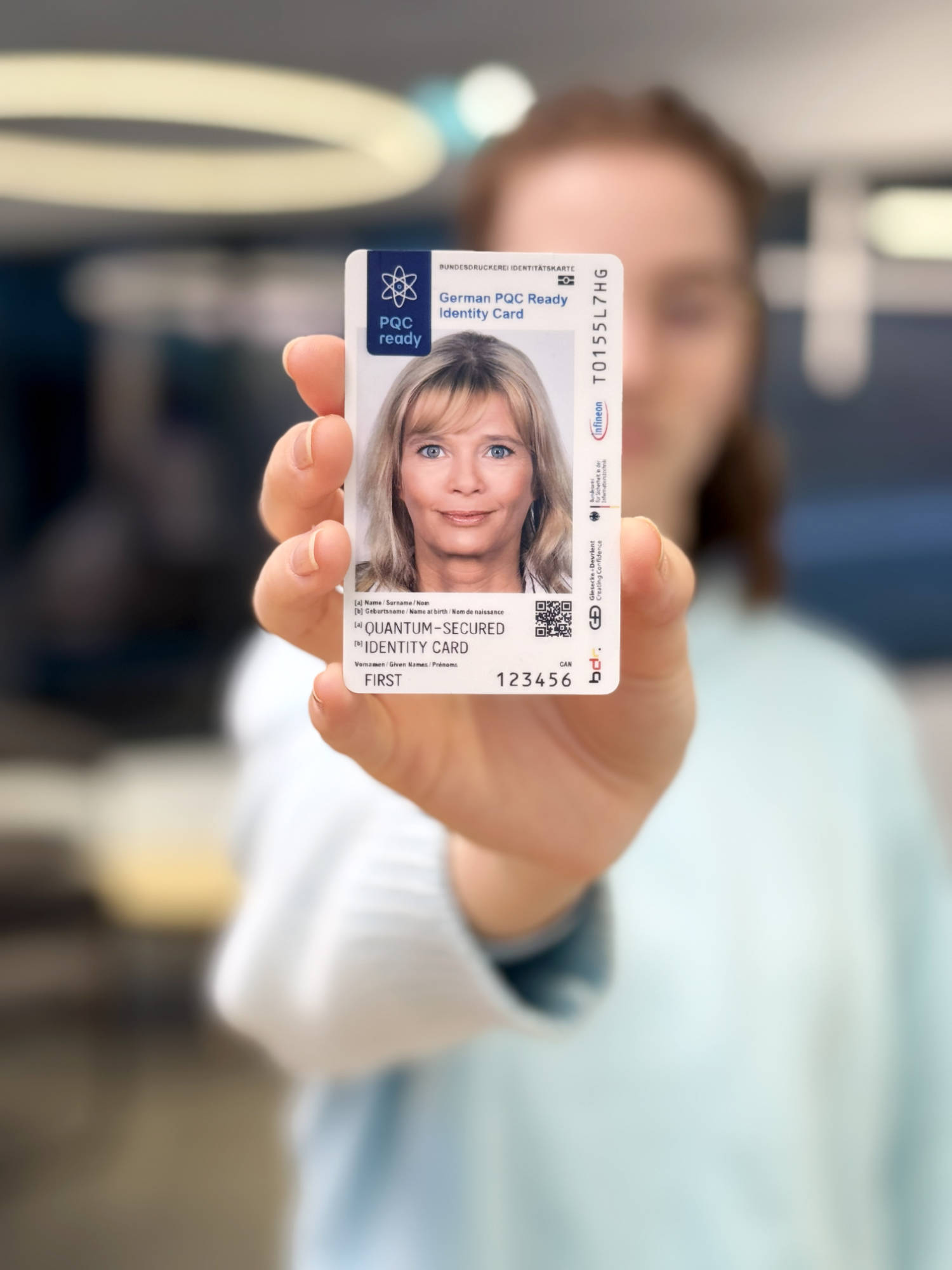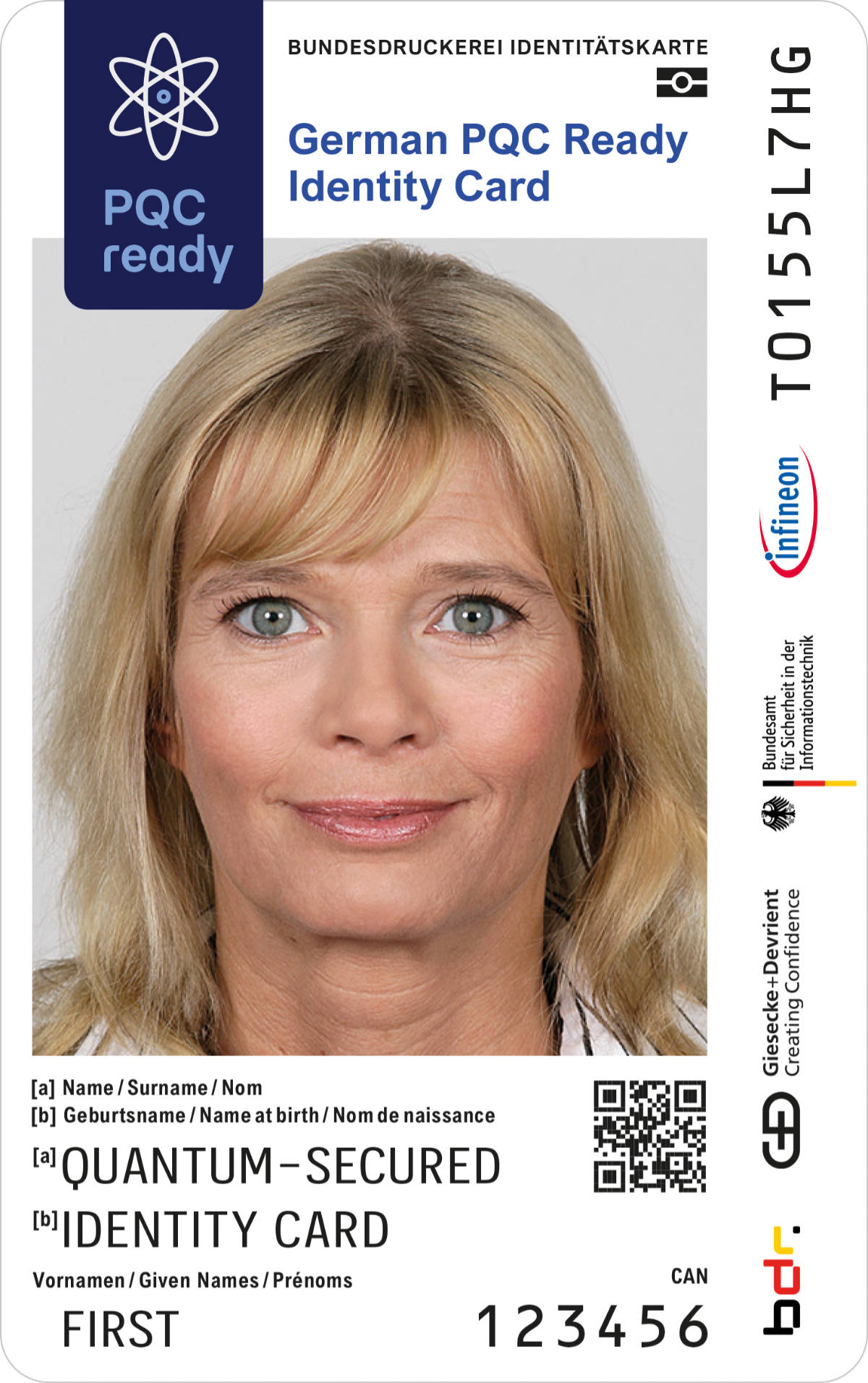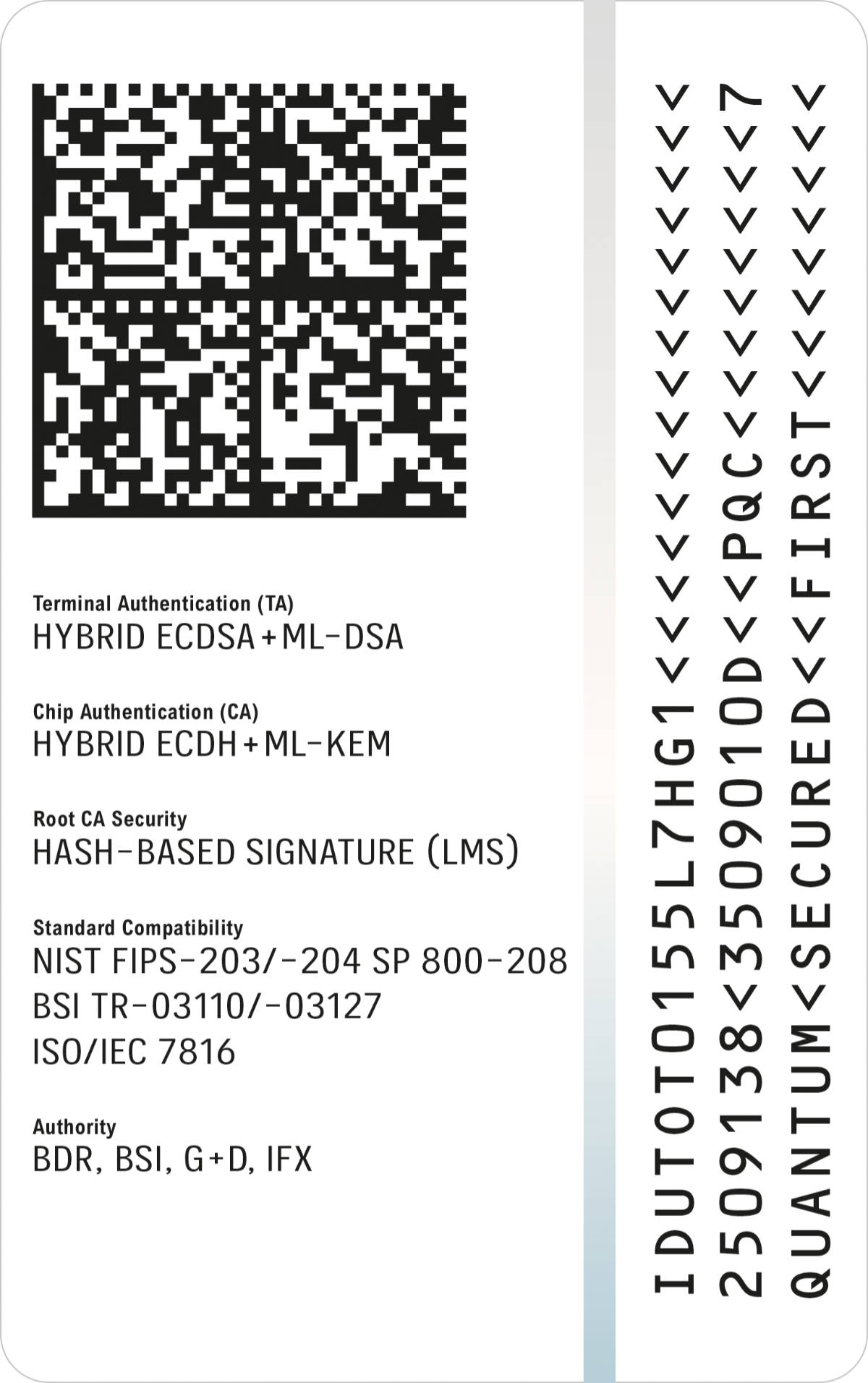Germany Sets Standards for Secure Identity Documents in the Age of Quantum Computers
- Post-quantum cryptography (PQC): preparatory work completed to make the next generation of the ID card the first in the world to be equipped with chips secured against attacks by quantum computers
- “A decisive step for the future security of digital identities”
- The technical foundation was developed by Bundesdruckerei, Giesecke+Devrient (G+D), the Federal Office for Information Security (BSI) and Infineon, and is currently one of its kind.
- Early implementation of hybrid PQC is crucial since ID cards are valid for ten years
Berlin/Munich, 10 November 2025 – Since its introduction in 2010, it has been regarded as one of the most secure government-issued documents in the world: the German ID card with its integrated online ID function (eID). To ensure it remains secure in the future, new ID cards must be protected against attacks by quantum computers – this applies to the hardware and software of all ID cards issued in the coming years. These government-issued documents are valid for ten years. Over the past few months, Bundesdruckerei GmbH and G+D have developed a technical foundation that is so far unique worldwide. The Federal Government’s technology company and the international security technology company jointly initiated development of the demonstrator with the BSI and implemented it on specialised chips from the semiconductor manufacturer Infineon.
The migration of the German ID card will then take place in two phases: First, the ID data will be protected against forgery with a quantum-resistant digital signature scheme. This will be followed by a full transition to quantum-secure technology.
The feasibility study (proof of concept) is one of the world's first functional implementations of an ID card using both classical cryptography and post-quantum cryptography, in line with current recommendations for quantum-secure algorithms. “Bundesdruckerei and G+D are the first in Germany to have demonstrated that highly secure, quantum-resistant cryptography, such as encryption and authentication, is possible on ID card chips. This is a decisive step for the future security of digital identities,” says Dr Kim Nguyen, Senior Vice President Innovation at Bundesdruckerei.
“The question is no longer whether there will be a future with quantum computers that can break current cryptographic algorithms, but when this so-called Q-Day will come. Companies are already testing the use of quantum computers, for example in materials science and drug discovery”, says Gabriel von Mitschke-Collande, Member of the Management Board and Group CDO at G+D. “We have to act now to protect our digital infrastructure. The transition to quantum-resistant encryption methods is not an option but a necessity. That is why we are very pleased that, together with Bundesdruckerei, we have outlined a future-proof path to combine the innovative potential of quantum computers with the appropriate security technology.”
Quantum computing technology has made great progress in many respects in recent years, but true scalability has still not been achieved and remains associated with major challenges. Powerful, error-correcting quantum computers could solve certain mathematical problems, such as computing discrete logarithms or prime factorisations, significantly faster than classical computers. This capability also has a dark side: quantum computers have the potential to break established cryptographic schemes, more precisely, certain key exchange and digital signature schemes. As a result, they pose an increasingly tangible threat to the security of IT systems and data. In particular, the sensitive personal data in government-issued ID documents must in future be protected against potential quantum attacks with post-quantum cryptography (PQC). An EU roadmap envisages implementation for critical high-risk use cases by 2030.
“Equipping the ID card chip with post-quantum cryptography is highly relevant, because from 2030 we must anticipate powerful quantum computers that can break current cryptographic schemes. By then at the latest, it must be possible to issue quantum-secure ID cards. We can be proud that Germany is taking a leading role in future-proof protection of government-issued documents”, emphasises BSI President Claudia Plattner. The BSI researches and documents the state of quantum-computer development in a regularly updated study.
G+D has many years of experience with PQC on hardware security elements through its participation in the Federal Ministry for Research, Technology and Space’s funding projects Aquorypt and Quoryptan. A key technological challenge in implementing PQC on the ID card chip was meeting the new security requirements while minimising the footprint of the resource-intensive PQC algorithms. With the proof of concept for the quantum-secure ID card, the companies have paved the way to securely integrating PQC schemes into the ID card. The Infineon chips used in the proof of concept offer a new chip design that facilitates fast and side-channel-resistant software implementation of PQC algorithms.
The Bundesdruckerei has also been working on post-quantum cryptography and quantum computing for many years. Together with Infineon and the Fraunhofer Institute for Applied and Integrated Security (AISEC), Bundesdruckerei developed the world’s first demonstrator for an electronic passport in 2022 that also meets the high security requirements for the era of quantum computing. Information on Bundesdruckerei’s quantum projects can be found here.
G+D has compiled further details on PQC and which cryptographic schemes could be broken by quantum computers here. Information and recommendations from the BSI on PQC can be found here.
Downloads

Demonstrator of a quantum-secure ID card, source: Bundesdruckerei GmbH

Front: Demonstrator of a quantum-secure ID card, source: Bundesdruckerei GmbH

Back: Demonstrator of a quantum-secure ID card, source: Bundesdruckerei GmbH
About Bundesdruckerei GmbH
Bundesdruckerei GmbH and its subsidiary Maurer Electronics GmbH are driving technological developments in the areas of identity and authorisation management, administrative digitisation, data analysis and artificial intelligence as well as government payment methods and value transfer systems. In this way, it forms the basis for a modern and resilient society.
As part of the Bundesdruckerei Group and with more than 250 years of experience, the company is paving the way to a secure digital future. Bundesdruckerei GmbH currently holds over 5,400 national and international patents, employs around 3,090 staff, and reported revenue of approximately €940 million in 2024. Further information: https://www.bundesdruckerei-gmbh.de/en
+49 (0)30 2598 2810
marc.thylmann@bdr.de
About Giesecke+Devrient
Giesecke+Devrient (G+D) is a global SecurityTech company headquartered in Munich. G+D makes life safer for billions of people. The company builds trust in the digital age with integrated security technologies across three business segments: Digital Security, Financial Platforms and Currency Technology.
G+D was founded in 1852 and today employs over 14,000 people. In the 2024 financial year, the company generated revenue of €3.1 billion. G+D has 118 subsidiaries and joint ventures in 41 countries. Further information: www.gi-de.com/en/
+49 89 4119-2164
christoph.lang@gi-de.com

